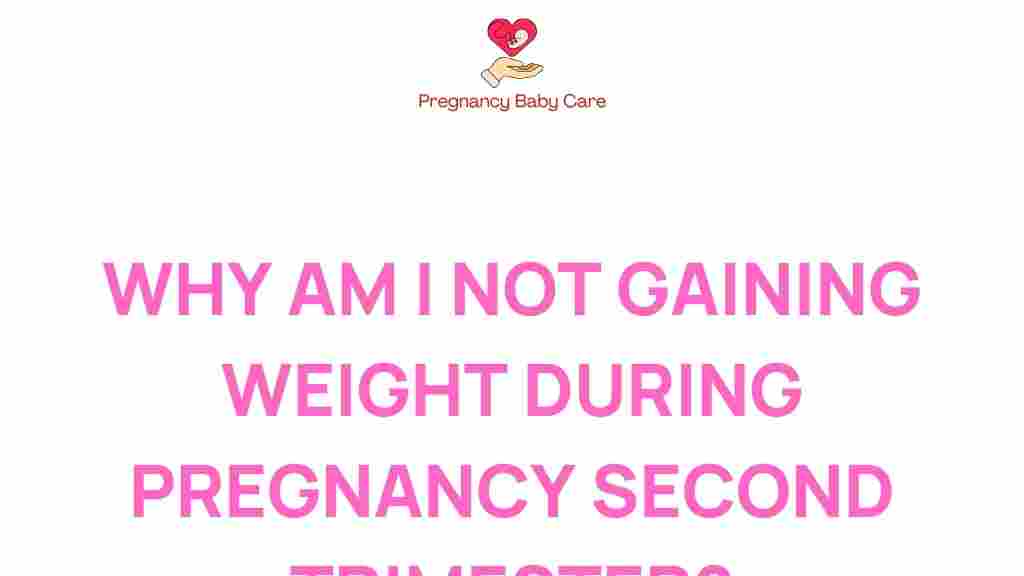Unraveling the Mystery: Why Am I Not Gaining Weight in the Second Trimester?
Pregnancy is a beautiful journey filled with anticipation and change. One of the most common concerns among expectant mothers is related to pregnancy weight gain. During the second trimester, women often wonder why they may not be gaining weight as expected. This article will explore the reasons behind this phenomenon, offering insights into maternal health, nutrition, and the importance of prenatal care for both the mother and the developing baby.
Understanding Pregnancy Weight Gain
Weight gain during pregnancy is a natural and necessary process, supporting the growth and development of the fetus. According to the Institute of Medicine, the recommended weight gain during pregnancy depends on a woman’s pre-pregnancy body mass index (BMI). For those with a normal BMI, a total gain of 25-35 pounds is typically advised.
During the second trimester, many expectant mothers experience a surge in appetite and may begin to gain weight more rapidly. However, it’s not uncommon for some to notice little to no weight gain during this period. Understanding the factors that influence weight gain is key to addressing concerns about fetal development and maternal health.
Factors Influencing Weight Gain in the Second Trimester
Several factors can impact pregnancy weight gain during the second trimester. Here are some common reasons:
- Dietary Choices: What you eat plays a crucial role. A diet lacking in essential nutrients can hinder weight gain.
- Morning Sickness: If you experienced prolonged morning sickness into the second trimester, it could affect your ability to eat and gain weight.
- Metabolism Changes: Pregnancy can cause changes in your metabolism, which may affect how your body processes food.
- Physical Activity: Increased physical activity can lead to weight loss or minimal weight gain.
- Hydration Levels: Fluid retention can influence weight fluctuations, making it seem like you’re not gaining weight.
Step-by-Step Process to Address Weight Gain Concerns
If you’re concerned about not gaining weight during your second trimester, consider the following steps:
1. Consult Your Healthcare Provider
Always start by discussing your concerns with your doctor or midwife. They can evaluate your individual situation, check your health metrics, and provide personalized advice on prenatal care.
2. Evaluate Your Diet
Take a closer look at your nutrition. Ensure that you are consuming a balanced diet rich in:
- Fruits and vegetables
- Whole grains
- Lean proteins
- Dairy products or alternatives
Consider keeping a food diary to track your intake and identify any nutritional gaps.
3. Monitor Your Symptoms
Keep track of any symptoms you may be experiencing, such as nausea or digestive issues. This information can be helpful for your healthcare provider to understand your situation better.
4. Stay Hydrated
Dehydration can lead to feelings of fatigue and decreased appetite. Aim to drink plenty of fluids, particularly water, throughout the day.
5. Engage in Gentle Exercise
While it’s essential to stay active during pregnancy, opt for low-impact activities like walking or prenatal yoga. These can help maintain a healthy weight without excessive strain.
Troubleshooting Tips for Weight Management
If you’re still struggling to gain weight, consider these troubleshooting tips:
- Snack Smart: Incorporate healthy snacks between meals, such as nuts, yogurt, and cheese, to boost calorie intake.
- Consult a Nutritionist: A registered dietitian can provide tailored meal plans and advice on achieving healthy weight gain.
- Consider Food Sensitivities: Sometimes, food intolerances can affect appetite and digestion. Discuss any concerns with your healthcare provider.
- Focus on Quality, Not Quantity: Concentrate on nutrient-dense foods rather than just adding empty calories to your diet.
Importance of Maternal Health during Pregnancy
Maintaining good maternal health is crucial not just for the mother but also for the developing fetus. Proper weight gain is linked to:
- Improved fetal development and health
- Lesser complications during delivery
- Reduced likelihood of postpartum weight retention
It’s essential to prioritize prenatal care, which involves regular check-ups, healthy lifestyle choices, and following your healthcare provider’s guidelines for weight management.
Understanding Fetal Development in Relation to Weight Gain
During the second trimester, rapid fetal growth occurs. The fetus develops vital organs and systems, making adequate maternal nutrition paramount. If you’re not gaining weight, it may be a concern for:
- The baby’s growth and development
- The mother’s overall health
- Potential future complications
Ensuring that you’re consuming enough nutrients will help support a healthy pregnancy and a thriving baby.
When to Seek Further Help
If you’ve made dietary changes and are still not gaining weight, or if you’re experiencing significant weight loss, it’s time to seek further help. Some warning signs to watch for include:
- Severe nausea or vomiting
- Excessive fatigue
- Signs of dehydration
- Any unusual symptoms that cause concern
In such cases, your healthcare provider may recommend additional tests or consultations to ensure both you and your baby are healthy.
Conclusion
Not gaining weight during the second trimester can be concerning, but understanding the various factors at play can help you navigate this pregnancy challenge. It’s essential to focus on nutrition, stay active, and prioritize maternal health through regular prenatal care.
Always remember that every pregnancy is unique, and what’s most important is the health and well-being of both you and your baby. If you have any concerns regarding your weight gain or overall health, don’t hesitate to reach out to your healthcare provider for support and guidance. For more resources on managing a healthy pregnancy, visit this helpful guide.
By taking a proactive approach and staying informed, you can ensure a healthy and successful pregnancy journey.
This article is in the category Pregnancy and created by PregnancyBabyCare Team
